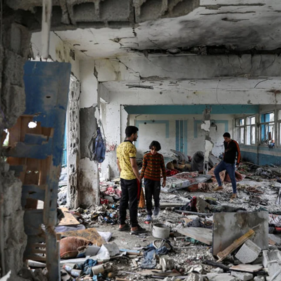International manufacturing unit exercise took an extra flip for the more severe in July, non-public surveys confirmed on Tuesday, an indication slowing progress and weak point in China have been taking a toll on the world financial system.
The downturn highlights the dilemma for policymakers who launched into aggressive tightening cycles in a battle to maintain inflation at bay and but additionally have to attempt to forestall potential recessions.
A Buying Managers’ Index (PMI) protecting the euro zone as a complete confirmed manufacturing exercise contracted in July on the quickest tempo since Covid was cementing its grip on the world as demand slumped regardless of factories reducing their costs sharply.
There was appreciable weak point in Germany, Europe’s largest financial system, whereas France and Italy, the second- and third-largest euro zone economies, additionally recorded marked deteriorations since June.
HCOB’s last euro zone manufacturing PMI, compiled by S&P International, fell to 42.7 in July from June’s 43.4, its lowest since Might 2020 and matching a preliminary studying. A studying under 50 marks a contraction in exercise.
An index measuring output, which feeds right into a composite PMI due on Thursday and seen as gauge of financial well being, dropped to 42.7 from 44.2, a low not seen in over three years.
The manufacturing downturn in Germany deepened initially of the third quarter as items producers recorded sharper declines in new orders, knowledge confirmed.
In the meantime, France’s manufacturing unit sector contracted additional in July though the downturn was not fairly as dangerous as first forecast.
“At this time’s PMI outcomes are an indicator of the continued uncertainty that the euro zone manufacturing sector is at present going through,” stated Thomas Rinn, international industrial lead at Accenture.
“Demand goes by a rocky patch. Dwindling output coupled with the knock-on results of inflation, labour shortages and shifting buyer preferences, all proceed to place a squeeze on companies.”
In Britain, outdoors the European Union, manufacturing unit output contracted in July on the quickest tempo in seven months, hit by greater rates of interest and fewer new orders, regardless of weakening worth pressures.
Japan, South Korea, Taiwan and Vietnam noticed manufacturing exercise contract in July, surveys confirmed, highlighting the pressure sluggish Chinese language demand is inflicting on the area.
China’s Caixin/S&P International manufacturing PMI fell to 49.2 in July from 50.5 in June, lacking analysts’ forecasts of fifty.3 and marking the primary decline in exercise since April.
The info was according to the federal government’s official PMI on Monday, elevating challenges for policymakers searching for to revive momentum in China’s post-Covid restoration.
“Manufacturing PMIs remained in contractionary territory throughout most of rising Asia final month and the underlying knowledge level to additional weak point forward,” stated Shivaan Tandon, rising Asia economist at Capital Economics.
“Falling new orders, bleak employment prospects and excessive stock ranges level to subdued manufacturing unit exercise within the coming months.”
Japan’s last au Jibun Financial institution PMI fell to 49.6 in July, from 49.8 in June, on account of weak home and abroad demand.
South Korea’s PMI stood at 49.4 in July, up from 47.8 in June however staying under the 50-threshold, a survey by S&P International confirmed.
Taiwan’s manufacturing PMI fell to 44.1 in July from 44.8 in June, whereas the index for Vietnam rose to 48.7 from 46.2, surveys confirmed.
In India, progress in manufacturing exercise slowed for a second month, however the tempo of enlargement remained wholesome and beat expectations.
Asia has been among the many few vibrant spots within the international financial system, although China’s slowdown clouds the outlook.
In revised forecasts issued in July, the Worldwide Financial Fund initiatives rising Asia’s financial progress will speed up to five.3 p.c this yr from 4.5 p.c in 2022. It expects China’s financial system to increase 5.2 p.c this yr after a 3.0 p.c enhance in 2022.





 For all latest news, follow The My News’s Google News channel.
For all latest news, follow The My News’s Google News channel. 



